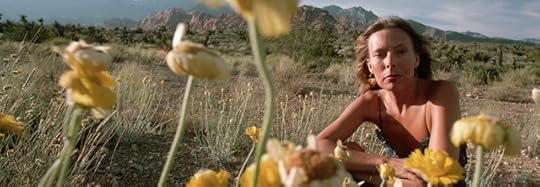Cactus Tree - Joni Mitchell
 For several years I worked in a mental health facility. My job as a caseworker and therapist exposed me in a clinical way to the female psyche. Out of that, I was able to write one of my first (as yet unpublished) novels, Unblinking. Written from a troubled woman's point of view, many an agent has asked why I was the most qualified writer for the job.
For several years I worked in a mental health facility. My job as a caseworker and therapist exposed me in a clinical way to the female psyche. Out of that, I was able to write one of my first (as yet unpublished) novels, Unblinking. Written from a troubled woman's point of view, many an agent has asked why I was the most qualified writer for the job. Aside from my experience in the mental health field, much of the little I understand of the female psyche I learned from Joni Mitchell. Though Joni's words aren't emblematic of womanhood, her focus is profoundly female. Her debut LP from 1968, Song to a Seagull, illustrates that voice from a youthful perspective, and while Joni would go on to far finer moments, particularly beginning with Ladies of the Canyon, Songs shows a woman of heart and mind with time on her hands, contemplating the world around her. The LP's, last track, "Cactus Tree," exemplifies that perspective in a way that breaks downs my testosterone-laden perspective.

"Cactus Tree" is a catalog of the singer's ex-lovers. She's new to the city, untethered and liberated, exploiting to the fullest the sexual freedom newly available to the fairer sex circa 1968. The imagery is hippie throughout, the schooners and beads and flowers and harbors. Her endless list of lovers brags of hippie promiscuity. For the first three verses, Joni presents her relationship through the eyes of men who hope to possess her, while she values freedom over commitment.
 In verse four, Joni openly "loves them all;" each night, a new good time. Is is love? For the moment. Here Joni's prowess as a writer blossoms as she sings, "She has brought them to her senses" – not their senses – and "They have laughed inside her laughter" revealing that it's all good fun; don’t take it too seriously. "She will love them when she sees them," until she moves on. That kind of honest contradiction has always intrigued me. A line from Prefab Sprout comes to mind: "He swore he'd never leave her; he meant it till he did." Yet this was March 1968—the very dawn of the sexual revolution. Women did not have sex outside marriage, certainly not with innumerable partners, and they certainly didn’t talk about it.
In verse four, Joni openly "loves them all;" each night, a new good time. Is is love? For the moment. Here Joni's prowess as a writer blossoms as she sings, "She has brought them to her senses" – not their senses – and "They have laughed inside her laughter" revealing that it's all good fun; don’t take it too seriously. "She will love them when she sees them," until she moves on. That kind of honest contradiction has always intrigued me. A line from Prefab Sprout comes to mind: "He swore he'd never leave her; he meant it till he did." Yet this was March 1968—the very dawn of the sexual revolution. Women did not have sex outside marriage, certainly not with innumerable partners, and they certainly didn’t talk about it. Joni sings it all with a catch in her voice – second thoughts? Regrets? Despite my experience and insight, I don't know; I'm in too deep. I cannot truly fathom a woman's mind. While I created the psyche of my character in Unblinking, can I really understand her at all?Ultimately, "She only means to please them." Am I reading it wrong; reading too much into it: a man's ultimate goal is to achieve pleasure; a woman’s to give it? It's hardwired into our brains and our psyches and our genitalia, and yet "Her heart is full and hollow like a cactus tree." Who knows if a cactus tree really is full and hollow? Go ask a botanist, but who cares? Joni knows, and all I can do is pretend to.
Published on November 26, 2018 04:06
No comments have been added yet.



